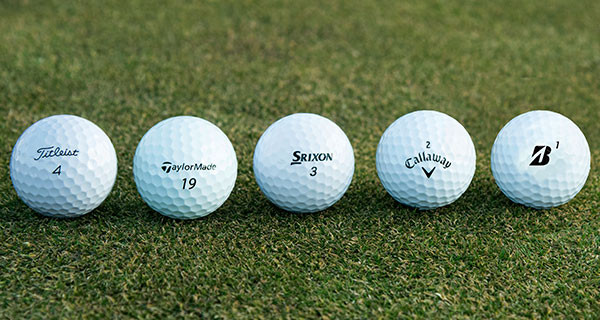A good ball greatly determines the accuracy of the shots as well as the player's performance and score. So choose the best and most suitable balls? This must be the question of many golfers. So do not miss the article: The most common types of golf balls and some tips for choosing a good one.
Popular types of golf balls
Nowadays, the types of golf balls are very diverse in the market, with various different models as well as different types of features. Golf balls are divided according to many criteria, such as brand, design structure, spin, etc. However, the classification that is still being used most commonly by golfers today is the classification by specific ball structure

Ball 1-layer
The single-layer ball is the simplest ball design, suitable for new players and recreational players. The ball has low compression, does not fly far and high, but will give players a soft feeling when in contact with the clubface. This type of ball is used during practice and is relatively inexpensive.
2-layers golf ball
Double layer golf ball is the perfect combination of distance and durability, so it is widely used in practice and competition. The ball core is made of solid material or hard plastic and enclosed with the outer shell. The 2-layer construction helps the ball fly farther and feels very real when making shots.
The outer shell is made from Surlyn – a special plastic material commonly used in professional golf balls. However, the disadvantage of this ball is that it is difficult to control, so the 2-layer ball is only for experienced players and has good ball control techniques before.
3-layer ball
Besides 2-layer golf balls, 3-layer models are also very popular. A 3-layer golf ball consists of a core made of hard rubber or liquid coated with another layer of rubber, with an outer shell of durable Surlyn or another material extracted from tree sap.
The 3-ply ball is softer and more spin, this construction has a higher spin rate than the 2-layer so this ball is especially suitable for players who are good at ball control.
The advantage of this type of ball is that it allows the ball to fly farther and higher, and helps players have a better ball feeling.
4-layer ball
4-layer ball is the most popular type of golf ball today
Is a new type of ball, designed with many modern advanced technologies. This is a type of ball that has won the affection of most amateur players to professional athletes.
The advantage of the 4-layer ball is that each layer of construction has different characteristics and purposes, combined to create a ball for a straight, long, and smooth flight.
First, the innermost layer is called the core layer, made of hard rubber material designed to create the most optimal distance.
The second layer is a support layer that is intended to increase the transmission of force from the club to the core of the ball.
The third layer helps increase distance without affecting the feel of the ball.
The outermost layer determines how the player feels when the ball makes contact with the clubface.
Normally, in the outermost layer of a 4-layer ball, there will be 300-500 indentations to create traction to help the ball fly farther and at a certain smoothness.
Some notes when choosing to buy golf balls

Besides deciding which ball to choose, players also need to consider some of the following criteria:
- Diameter, ball size
Commonly, golf balls have a diameter of fewer than 1.68 inches i.e. not exceeding 42.67mm
- Ball weight
The weight of the heavy ball does not exceed 1.62 ounces or 45.93 grams.
- Initial acceleration.
Do not exceed 250 feet/sec or 76.2m/sec.
- The dents on the ball
The best golf balls often have indentations in the cover surface, which help the ball travel further and reduce unwanted spin. The speed of the golf ball when leaving the clubface is on average 200km/h and the ball moves under the action of thrust, causing the ball to spin when leaving the clubface, when the ball rotates the depressions on the ball will friction with the air. help the ball maintain the most accurate flight direction.
- Ball core design, glossy shell
The current ball types are designed according to many structures: 2 layers, 3 layers, 4 layers, etc. Golf balls will have hard or soft cores, this structure mostly determines the features of the ball.
The advice for players is to choose balls with hard cores, made of liquid materials. The outer shell can be preferred softer and thinner, with surlyn material as possible. This structure will help the ball fly more straight and the player also has a better ball feeling.
- Ball compression ratio
This is a measure of ball performance, as measured by the deflection of the ball at the time of contact with the clubface. This reading is usually in the range of 30 – 130 psi. If the compression ratio is higher, the ball will fly farther, because when it comes into contact with the ball, it stores a larger amount of energy.
It will be difficult for a new player to distinguish and evaluate the ball selection criteria well. So go to professional stores to listen to the advice of highly qualified professionals. If you are just starting to get acquainted, you can consider choosing an old golf ball to save money in practice.

